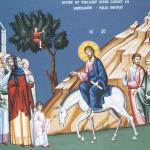
While with what realism tells us, contra nominalism, there can be and is a real relationship between the words we use and the objects (or essences) invoked by those words, nonetheless, that relationship is something which has been built up or constructed, contra some who hold to a realist philosophical position. There can be and are many names (or words) used to connect us to the various essences or objects which we discuss. While nominalism, therefore, is right, in talking about the way words develop, it is wrong about the metaphysical interpretation and meaning which it uses to explain that development. Those who hold to realism can do so while agreeing with what Xunzi said, that is, words or names are developed by us in such a way that there was no predeterminate reasons why we use certain names to connect to the essences we use for those names:
Names have no predetermined appropriateness. One forms agreement in order to name things. Once the agreement is set and has become custom, then they are called appropriate, and what differs from the agreed usage is called inappropriate. Names have no predetermined objects. One forms agreement in order to name objects. Once the agreement is set and has become custom, then they are called names of objects. Names do have a predetermined goodness. If they are straightforward, simple and do not conflict, then they are called good names.[1]
We make a way to connect words to the things invoked by them, and once that connection has been made, we can either invoke the essences themselves by the words we use, or at least properly point to them, so that our words do not represent meaningless babble. That is, we can invoke things by the names we have given them. Nonetheless, over time, as words change, it is possible for the agreement which binds a word to a particular essence can be destroyed, and when this happens, the invocation which used to occur by their use can and will be denied. This is like what is seen in the sacraments, such as in relation to the eucharist. When the accidents of bread and wine are no longer present, the real presence itself is lost, but recognizing this does not mean the presence was never there. Nominalism was wrong in denying the connection made between a word and what is presented in and through the word, but this is because it did not understand that the creation of a word included the creation of a bond between the word and what is intended by the word when it is used. Realism understood the bond, but many of its adherents did not understand language and its development over time.
Understanding this will help us better understand our relationship with God and the way we name God. We can and do encounter God through the names we give to the divine nature. Contra nominalism, we have a real connection with God through the names we have for God, however they have been made. It is important for us to realize that many of them come to us from God, established by God on our behalf. Others come from the way we describe God through the energies or actions God takes toward us. In both instances, the names are real because they truly connect us to the divine, and because of that, we can encounter the presence of God through those names, such as when we invoke them in prayer. Nonetheless, we must keep in mind, all those names posterior to God, that God transcends them, and so in a way, is nameless, as the essence of God cannot be constrained or comprehended by any limited thing. Or, it can be said that in God’s eternity, there is no name for God, which is represented by St. Isaac the Syrian when he wrote: “There was <a time> when that there was no name for God, and there is going to be when he will not have one.” [2] The translator added “time” here, and we can agree with that use, for there was certainly a time in which we did not have any names for God. But it is important to keep in mind that God’s namelessness in history comes from God’s essential namelessness in eternity. Names, even the name or title of God, are predicated to God in particular times, and places, and are not needed in eternity. All of them have a time in which they were constructed or given to us, giving them a beginning, and as they have a beginning, they can also be said to have an end, which shall be when time itself comes to an end. In the eschaton, God will be known and experienced in a way beyond names. This is not to say in eternity, all the temporal names will now become falsehoods; they were brought into being, constructed in such a way to have a real connection with God, and so those connections were real and will always have a place in God’s eternity activity. Thus; in eternity, we will discern the reality of the names, we will better understand how and why they were confirmed, and have a place in the temporality which is bound by eternity. We will understand them to be relative constructions, relative truths which must give way to the absolute truth which transcends them. It is in this giving way to the absolute truth they can properly participate in it the reality of God, and so be shown to be true. And so, though we can and must say, God transcends names, and is in a sense, eternally nameless, the divine energies, and names which we give to them, are also eternal as God is unchanging and all God’s temporal activities which relate to those names are part of God’s unchanging absolute eternity.
This is a paradox which can only be understood by the realization of what was just said, that the words or names used to discuss the truth, to discuss the absolute truth, God, are in themselves relative truths. To be confirmed in eternity and shown to be true, they must always give way to the absolute truth; their value lies in the way they point to and connect to the absolute truth which transcends them. They are real, and true, and filled with the divine, because in and through them, we have nothing but the divine itself. This is how and why divine simplicity itself is not contrary to the teaching of the divine energies. All the divine energies, all the divine names, present to us various kinds of perfections, and through them, various ways which we can and do apprehend God. In making them, we use those things which are great, those things which represent some sort of perfection, and see how they are connected with the greatness and perfection of God, but then, we must make way, to understand behind all those apprehensions there is one God, one divinity, one undivided, simple essence, of which they all represent in a conventional, relative way:
The names by which it ought to be called are the names that signify perfection and excellence of existence for the existents around us. Yet nothing in those names should signify that it is of the perfection and excellence those names customarily signify with respect to the existents around us, but rather of the perfection that particularly characterizes it in its substance. Moreover, the kinds of perfections that are customarily signified by the many names are many. And it ought not to be presumed that the kinds of its perfections signified by its many names are many kinds into which it is divided and by all of which it is made substantial. Rather, those many names ought to signify a single substance and a single existence that is not at all divided. [3]
Thus, though we construct and engage ways to embrace the absolute truth, the absolute truth remains one, beyond all the names and constructs used to represent it. Nonetheless, in its transcendence, it does not deny those relative constructs but engages them with its immanence, allowing each of them to truly connect us to the divine, to God. This is what we must keep in mind, lest, we either turn names into meaningless babble which has no connection to God, or turn them into idols, into absolutes, and so find ourselves attaching ourselves to some limited convention of the truth and confusing it for the absolute. This is what Henry of Ghent, following many before him, said what happens with idolatry:
Hence, the fact that idol worshipers among the people claimed that God is something by his essence and in actuality, did not come from some knowledge that they had about God’s essence or existence, but from the faith they had in the philosophers, who knew that about God through arguments from creatures, as was stated above. They also had form them a notion of what is expressed by this name “God.” And, therefore, they erred in the determination of what they understood by the name. For each of them claimed that God is that which he preferred to other things –some the sky, others the sun, still others the moon – and in that way different people spoke in different ways, as Augustine says in book three of On Christian Doctrine. They would never have done this if they had truly known something about whether God is. For whatever of the divine nature is known to be, its being is not known except by knowledge that it surpasses everything that is found in a creature. [4]
We must never forget that names are constructions, and though they can and do have real connection to what is named, they are to be understood as relative pointers to that which is named. When trying to understand the words or names used, we must remember how they are constructed, to recognize the poetic or metaphorical element involved. We must not become hyper-literal with our understanding of the names, for then it will lead us to misconstrue God as we limit God to what those words mean. And, certainly, a hyper-literal approach will cause confusion when the meaning of words change, as it will lead people to having different notions and understandings of God, with many of them debating each other based upon the different understandings of those words. Indeed, if we try to hold to a hyper-literal understanding of the words we use to represent and name God and absolutize that meaning to make God conform to the word instead of the word to God, we will find ourselves not only erring in our determinations about God, we will find our erring changes, and likely becomes worse, over time, as the original signification of the words will not be understood. If, however, we understand this, then we shall be able to use the words properly, and through them, have ways to connect to God, and invoke God and God’s presence through them, contrary to what nominalism would suggest, for their notions would suggest we must disconnect the relationship between the relative and absolute truth, leaving us only with relative truths and no way to apprehend the absolute.
[1] Xunzi, The Complete Text. Trans. Eric L. Hutton (Princeton: Princeton University Press, 2016), 239.
[2] St. Isaac of Nineveh, Headings on Spiritual Knowledge (The Second Part, Chapters 1-3). Trans. Sebastian Brock (Yonkers, NY: St Vladimir’s Seminary Press, 2022), 139 [Chapter 3; Third Discourse].
[3] Alfarabi, “Political Regime” in The Political Writings, Volume II. Trans. Charles E. Butterworth (Ithaca, NY: Cornell University Press, 2015), 44.
[4] Henry of Ghent, Henry of Ghent’s Summa: The Question on God’s Existence and Essence (Articles 21 – 24). Trans. Jos Decorte and Roland J Teske, SJ (Leuven: Peeters, 2005), 203 [Art 24 Q3].
Stay in touch! Like A Little Bit of Nothing on Facebook.
If you liked what you read, please consider sharing it with your friends and family!
N.B.: While I read comments to moderate them, I rarely respond to them. If I don’t respond to your comment directly, don’t assume I am unthankful for it. I appreciate it. But I want readers to feel free to ask questions, and hopefully, dialogue with each other. I have shared what I wanted to say, though some responses will get a brief reply by me, or, if I find it interesting and something I can engage fully, as the foundation for another post. I have had many posts inspired or improved upon thanks to my readers.













